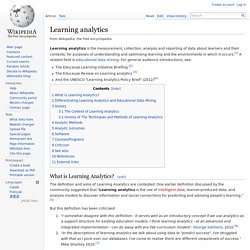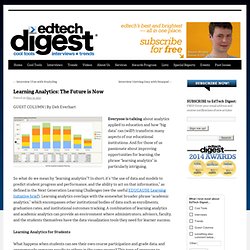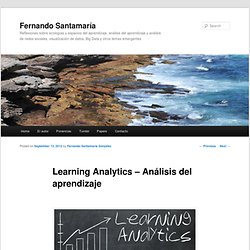

Learning analytics. Learning analytics is the measurement, collection, analysis and reporting of data about learners and their contexts, for purposes of understanding and optimising learning and the environments in which it occurs.[1] A related field is educational data mining.

For general audience introductions, see: The Educause Learning Initiative Briefing [2]The Educause Review on Learning analytics [3]And the UNESCO "Learning Analytics Policy Brief" (2012)[4] What is Learning Analytics? [edit] The definition and aims of Learning Analytics are contested. But this definition has been criticised: "I somewhat disagree with this definition - it serves well as an introductory concept if we use analytics as a support structure for existing education models.
A more holistic view than a mere definition is provided by the framework of learning analytics by Greller and Drachsler (2012).[8] It uses a general morphological analysis (GMA) to divide the domain into six "critical dimensions". History[edit] Software[edit] Learning Analytics: The Future is Now. GUEST COLUMN | By Deb Everhart Everyone is talking about analytics applied to education and how “big data” can (will?)

Transform many aspects of our educational institutions. And for those of us passionate about improving opportunities for learning, the phrase “learning analytics” is particularly intriguing. So what do we mean by “learning analytics”? In short, it’s “the use of data and models to predict student progress and performance, and the ability to act on that information,” as defined in the Next Generation Learning Challenges (see the useful EDUCAUSE Learning Initiative brief). Learning Analytics for Students What happens when students can see their own course participation and grade data, and anonymously compare results to others in the same course? Based on this increased understanding of the value of specific behaviors, students can make better informed decisions about how to use their limited time and whether or not to change their behaviors. Like this: Like Loading... Learning Analytics – Análisis del aprendizaje.
Ayer tuve la ocasión de escuchar la conferencia de George Siemens que dió en Buenos Aires sobre la evolución del paradigma del conectivismo.

En el le plantearon un peegunta (en la que tuve ocasión de formular también) y me alegre por la respuesta (que ya más veces lo ha planteado así Siemens), ya que baso mucho del cambio en los procesos analíticos del aprendizjae y en la ciberinfraestructura an la era del Big Data para poder llevar acabo movimiento de cambio en el sistema educativo. Pasamos hablar de ello de manera informal y como si se tratara de pequeños apuntes del análisis del aprendizaje (Learning Analytics) y el movimiento del yo quantificado / autocuantificación (otra rama del yo aumentado de manera analítica).
En este tema aprenderás los conceptos básicos sobre Análisis del aprendizaje, lo que significa analítica para el aprendizaje, cómo y por qué queremos analizar el aprendizaje, y lo que los datos sobre educación nos puede decir sobre el aprendizaje y los aprendices. LEARNING ANALYTICS (Analíticas de Aprendizaje). Qué, cómo y para qué. ¿Qué?

La idea principal del Learning Analytics se basa en analizar los datos que deja tras de sí el estudiante en los procesos de formación y aprendizaje. El objetivo es utilizar dicha información para mejorar el propio proceso de aprendizaje.Los datos se pueden obtener a través de las distintas tecnologías que se utilizan actualmente en la formación; dichas tecnologías pueden ser corporativas (por ejemplo sistemas LMS tipo Moodle), propietarias de los alumnos (móvil, tablet, portátil) e incluso sociales (redes sociales, blogs,……) ¿Cómo?
Sobre la información recopilada se aplican procesos basados en la toma de decisiones, construcción de modelos, minería de datos y aprendizaje automático. ¿Para qué? Desde los grupos de investigación LITI y GIDTIC estamos trabajando en esta línea, en la aplicación del Learning Analytics para solucionar problemas derivados del alto coste y esfuerzo que supone aplicar paradigmas de aprendizaje. Me gusta: Me gusta Cargando...